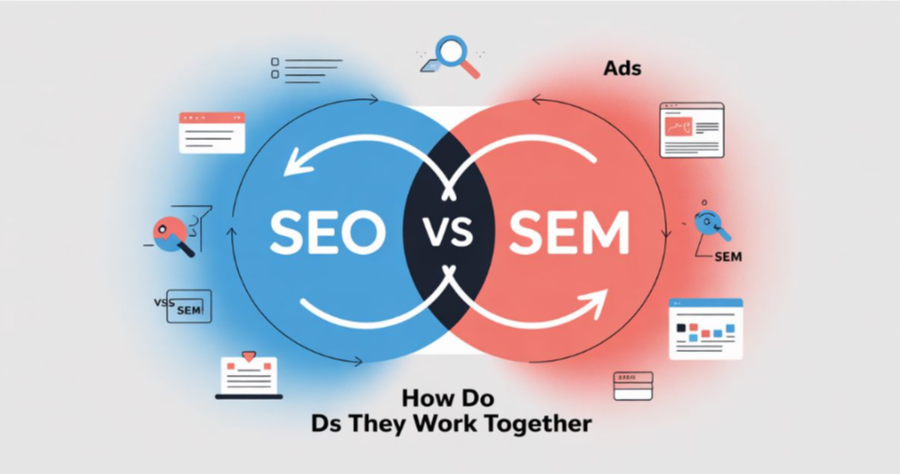
In the UK’s digital landscape today, companies cannot afford to be ignored by search engines like Google, Bing or Yahoo. SEO Versus SEM Which Is the Best Inclusion in Your Core Strategy? You know that you need SEO and SEM as a cornerstone to drive traffic (& visibility, sales) to your products. Despite the many marketers who mix and match these terms, they actually have different responsibilities within your digital marketing pageboy. If you want to reach the right people in your business, and at the right time, combining both SEO and SEM would be your ticket to success knowing the difference, advantages and blend of SEO and SEM could be a game changer for you. . This guide will dissect everything about SEO vs SEM, their synergy and the strategies to win in the ever-changing game of online search in the UK.
Search engines are more than mere compilers of Web sites. They now understand intent and semantic search, which means that the words you type are parsed for context, not just exact matches, thanks to NLP (natural language processing) algorithm breakthroughs. By utilising SEO to be found in a naturalistic manner, and SEM as a bolt on to your existing strategy, you can cover both ends of this spectrum and bring the kind of traffic that is seeking solutions to this query to your paid and natural results. This post deciphers a little of the mechanics, expenses, future, and the experts’ take on crafting one comprehensive search marketing strategy
1. SEO vs SEM difference.
SEO is the process of optimising your website so visitors can find you when they search online. It is a method to help search engines know what you are talking about (search spiders don’t know what an image or a video is) and it will help you to rank better if you are producing something valuable to the world. This establishes authority and enhances credibility over time while maintaining SERP visibility. UK SEO investment offers traffic sustenance A well planned content strategy, matched to content relevant keywords and user intent, means that your site is found more easily.
SEM (Search Engine Marketing) Is the combination of SEO and pay-per-click advertising like PPC Campaigns. It’s a way for UK businesses to appear more quickly in search results. While SEO establishes credibility over time, SEM receives that very search visibility. Realizing this difference can aid organizations in planning the expenditure, resources, and strategy in order to match the short-term and long-term objectives.
Key take away: SEO gains authority and organic credibility while SEM provides immediate visibility through paid advertising campaigns. Combining both maximises reach
2.How does SEO work?
SEO works by finding out what UK users are searching for online and then matching them with your website. Search engines like Google use advanced NLP algorithms to understand the pertinence, context and intent of user’s pages.. This includes keyword analysis, level of content, site structure and external signals such as backlinks. Keyword frequency is not the only thing Google assesses; topic modeling, semantic search, and long-tail keywords are considered by Google too. The former also outperforms the later in terms of the information-rich answers, useful resources and \emph{contextual keywords} provided.
The four main types of SEO include technical SEO, onpage SEO, offpage SEO, and local SEO. Technical SEO makes your site fast, easier to crawl, and compatible for mobile devicesOn-page SEO – Content, Heading and Contextual keywords/optional stuff? Which will be content, heading etc. Off page SEO is building trust through mentions and backlinks from authority websites.. Local SEO focusses on influencing local searches and its importance to UK businesses cannot be overstated. Local search visibility – tools such as Google Business Profile and UK directories enhance local search visibility, meaning you get more high-intent traffic.
Takeaway: SEO optimises content, keywords, and site structure to increase organic visibility and better fits user intent.
3.How does SEM work?
SEM is used to lead traffic to your site with paid search advertising and focused campaigns. SEM shows your ads at the top of search results, bringing you instant traffic, whereas SEO is a long-term strategy that takes time to establish authority. UK advertisers will be able to bid on keywords, to target by location, device or by demographics, and will also enable measurement with analytics
SEM fundamental parts are PPC, display ads, social ads, and video campaigns. Good use of SEM In addition to keyword bidding, there is also the use of contextual words, negative words to avoid irrelevant searches and optimised landing pages. SEM does need continuous investment for clicks, but it gives you a good indication for keyword performance, user intent and conversion optimisation, all of which benefits your SEO strategy as well.
Bottom line: SEM brings the door banger who buys right now, while working alongside SEO for long-term sustainability.
.
4.How can you make the best out of SEO and SEM?
When you align SEO and SEM, you get a great synergy for traffic and conversions. Insights from PPC campaigns reveal to you a list of high-performing long-tail keywords and strong SEO content that will steer your ad targeting. The union of these approaches will allow you to benefit from the largest share of search traffic both in the organic and paid results.
For instance, a UK-based ecommerce store may have SEM ads with a theme about seasonal sales but opt for SEO optimized blogs targeting relevant contextual keywords. This maintains a high visibility once any paid campaigns come to an end and helps boost SERP ranking. Testing ad campaigns can also be a great way to align page content with semantic search; making sure that content matches user intent.
Bottom-line: SEO plus SEM equals high-quality traffic, constant ranking and 24-hour online presence.
5.What is the cost of SEO and SEM
It takes time, it’s skilled work – and you need the gear.
.Costs here include SEO audits (£500–£2,000+), content, backlink building and analytics. SEO software such as SEMrush, Ahrefs, and Google Analytics is critical for keyword tracking, topic modeling, and named entities. Content outsourcing for SEO-focused blogs can be as little as £0.05–£0.20 per word, however, quality content increases authority and visibility.
SEM pricing depends upon PPC bids, daily budgets, and campaign complexity. With platforms like Google Ads or Bing Ads, businesses can laser-focus on search queries. Additional expenses are A/B testing, analytics, and continuously getting better. Both of these strategies can be married together and make sure the SEM efforts are also enjoyed for SEO, by way of high performing keywords and content segments. The bottom line : SEM gives you NOW visibility and SEO builds your authority long-term and both are something you want to strategically invest in.
6.SEO and SEM: future directions
The Future of SEO and SEM: AI, Big Data, and User Behavior Changed Querysemrushcom3.Which one is the best: A Search Engine vs. A Directory? With Google’s Search Generative Experience (SGE), user intent is what counts and answers are placed front and center on SERPs. This makes it necessary to optimize for relevance, conversational language, and context keywords. Zero-click searches are growing, meaning marketers need to reevaluate their content strategy.
New platforms like YouTube and TikTok are search engines as well. It’s important to effectively optimize video content and keywords for these channels. AI tools Surfer SEO and Jasper. ai assistance evaluating topic modeling, keyword density, named entities. UK companies which adopt AI, concentrate on user intent, and invest in quality content will be ahead in search marketing.
Takeaway: SEO/SEM efforts must incorporate AI, semantic search, and new platforms, according to marketers.
7. Become a search marketing expert
Learning SEO and SEM gives marketers the power to deliver traffic, conversions, and revenue. Courses from Neil Patel Digital and Digital Marketing Institute cover keyword research, content optimisation, PPC management and AI-driven search tools. Common UK roles in this field are SEO Manager, SEM Specialist, Digital Marketing Analyst and PPC Manager.
With a focus on hands-on experience and formal training, this prepares marketers to be in a position to capitalize on contextual keywords, semantic search, and topic modeling to get ahead of the competition. Knowing what are the range of SEO vs SEM, will let a business gain high-quality traffic, and will give them the edge to dominate search appearance on variety of platformsHere are the main takeaways: Learning how to do SEO and SEM will open a world for career paths, business expansion plan, and an infinite long-term appearance on line
FAQ
What is the difference between SEO and SEM?
SEO = PR + Branding + PaidSEM = searches + Paid SEO helps you rise the organic visibility and SEM leverages the paid ads for instant traffic.
Is SEO related to SEM?
Yes. By utilising both then you’re able to crush it on both fronts and see the maximum level of traffic, both conversion-driven and general SERP-visibility based.
How Long Does SEO Take to Work?
SEO requires months, based on quality, links, and technical optimisation. SEM provides instant visibility.
How much does SEM cost compared to SEO?
SEM requires ongoing ad spend. SEO involves investment in content, audits, and tools. SEM delivers faster results, SEO builds authority.
Will AI affect SEO and SEM?
Absolutely. AI, semantic search, and features like SGE are reshaping search behaviour. Optimising for user intent and contextual keywords keeps sites competitive.
Conclusion
Understanding SEO & SEM and how it works is not becoming an optional business practice for online success for many businesses today. SEO creates a (solid) base by increasing organic authority and interested visitors that want to hear what you have to say, while SEM gets you now traffic and hyper focuses visitors through the use of advertising. Applied in tandem, these strategies provide a strong balance to keep your business grabbing the long-term rabbits while gorging itself on short-term treats. By focusing on user intent, contextual keywords and quality content, UK businesses will be ahead of the competition when it comes to the search engine race, connecting with the ones that matter, making their own luck and outstripping the competition in 2025, and beyond.




